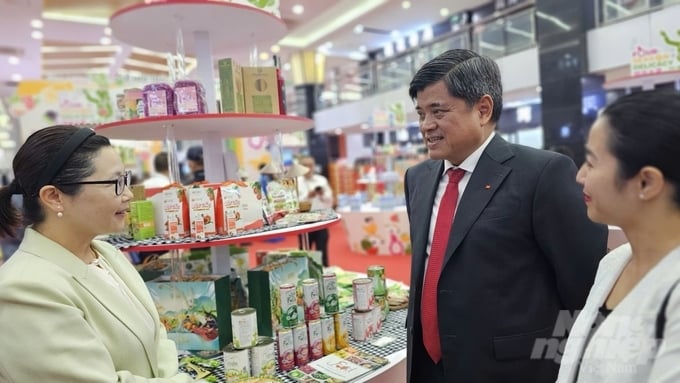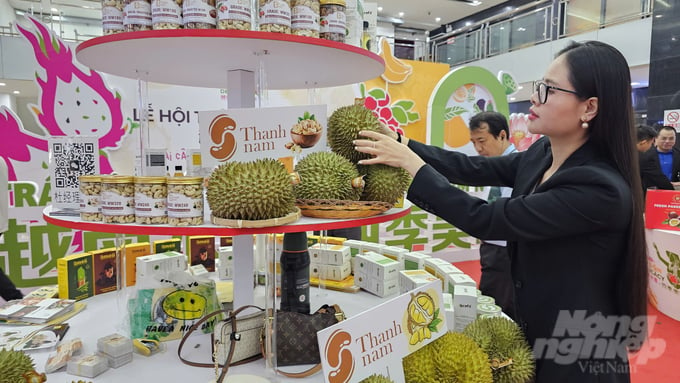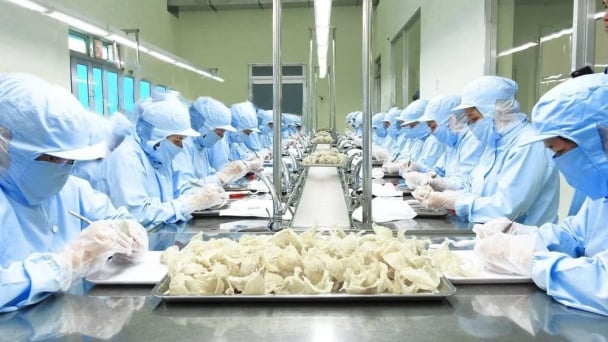May 17, 2025 | 09:39 GMT +7
May 17, 2025 | 09:39 GMT +7
Hotline: 0913.378.918
May 17, 2025 | 09:39 GMT +7
Hotline: 0913.378.918

Deputy Minister of Agriculture and Rural Development Tran Thanh Nam discusses with Chinese businesses at the first Vietnam Fruit Festival, held in Beijing, China. Photo: Van Viet.
"Us fruit sellers are able to recognize Vietnamese fruits from that of other Southeast Asian countries, such as Malaysia, Thailand, and Laos. Nevertheless, the majority of consumers in Beijing and other regions consider it tropical fruits. Vietnamese products are the highest quality. This reality is unfortunate," stated Mr. Gu Zhaoxue, Deputy General Director of Xinfadi Agricultural Wholesale Market.
Xindifa is not only the "agricultural cart" of Beijing, but also the "representative" of the Chinese agricultural sector and the Chinese brand.
China appears to be a significant agricultural market due to its swift economic growth rate, as per Gu. in which Beijing serves as a major agricultural consumption "market."
"Beijing is not hesitant to purchase expensive goods, but it is hesitant to purchase those of poor quality. In the larger picture of our trade, the mere mention of Vietnamese products naturally implies exceptional quality. I believe that the Vietnamese should come up with strategies to increase the awareness of their agricultural products among Chinese consumers", Mr. Gu, the Deputy General Director of Beijing's largest agricultural wholesale market, stated, "With fruits this good, you need to ensure that even when Beijingers are commuting, they think about savoring Vietnamese fruits, and when they sleep, they dream of Vietnamese fruits."
He also emphasized that promotion efforts must be both "online and offline." From an "offline" perspective, Mr. Gu suggested that events like the Vietnam Fruit Festival, which took place for the first time in Beijing on September 29, should be held at least once a year. On the "online" platform, he noted that Vietnamese businesses seem to lack sufficient attention in this area.
Working in the field of agricultural trade for nearly 30 years, Mr. Gu admitted that he's hardly seen any systematic advertisements for Vietnamese fruits.
"I am uncertain as to the reason. Maybe I have not read much. But what I continue to think is why the general public continues to refer to these delectable fruits as tropical fruits, without realizing that they originate from Vietnam", said Gu.

Vietnamese businesses display durian—one of the fruits favored by the people of Beijing. Photo: Van Viet.
Mr. Gu believes that the "increasingly fierce competition" among countries to establish a presence in China's competitive domestic market is one of the reasons Vietnamese agricultural products are not yet the preferred choice of Beijing consumers.
For instance, Laos has been conducting exhibitions at the Xinfadi Market in order to promote its agricultural products for the past few years. On September 28, Malaysia initiated an additional extensive promotional campaign for durians in Beijing.
Mr. Gu stated that labor costs in Laos are among the lowest in Southeast Asia, at approximately 20 yuan (approximately 80,000 VND) according to his own research. "In terms of unique fruits, Laos may not yet match Vietnam, but with cheap labor and a good supply of fruits, it might become a competitor to your market."
Furthermore, Guangxi's cultivation of dragon fruit and durian, two of Vietnam's most significant crops, is also underway. Mr. Gu emphasized that this is a matter that Vietnamese farmers and enterprises should consider.
Tropical fruits are not the only items on display at Xinfadi; temperate countries also contribute their products. Over the past few years, even Central and South American nations have progressively begun to establish their presence in Beijing.
Mr. Gu recalled that about fifteen years ago, people in Beijing began to become familiarized with dragon fruit and durian. Currently, the majority of Beijingers associate both of these fruits with Thailand or Malaysia.
"Vietnamese businesses should conduct exhibitions or a similar event in Beijing or other provinces at least once annually. Beijing, Shanghai, and Guangzhou are, of course, the most prominent premium markets. Furthermore, numerous other markets hold geographical advantages. Why are Vietnamese enterprises not adopting this approach, while countries such as Chile, which is located at quite a distance, continue to import their agricultural products?", Mr. Gu offered his opinion.
Translated by Linh Linh

(VAN) Japan's efforts to lower the price of rice through the release of its stockpile may finally be making some progress, albeit at a snail's pace.

(VAN) U.S. tariffs are not only a 'shock', but also an opportunity for Vietnamese businesses to renew their mindset toward comprehensive development.

(VAN) As Bac Giang lychee enters the harvest season, Minister Do Duc Duy expects that the fruit will contribute greatly to agricultural exports due to standardized production and deep processing.

(VAN) Consumers have shown a preference for free-range eggs, but those farming systems are more vulnerable to biosecurity risks like bird flu.
/2025/05/09/5701-1-184335_301.jpg)
(VAN) Vietnam’s eel exports nearly doubled thanks to a mud-free farming model, opening up new prospects while still facing numerous barriers related to international standards.

(VAN) Minister Do Duc Duy warned that if production is not professionalized and supply chains are not transparent, the U.S. market could become a growth bottleneck.

(VAN) Delegating surveillance responsibilities to local authorities is a cost-saving and efficiency-boosting measure that removes a key bottleneck for enterprises, according to Director General Duong Tat Thang.